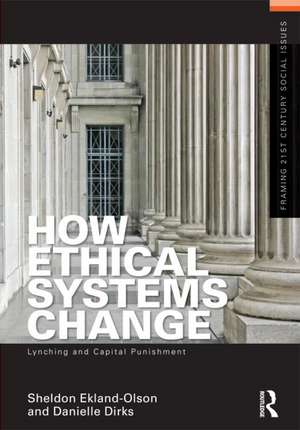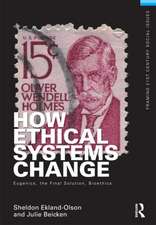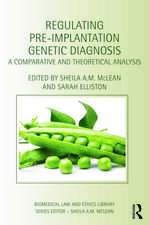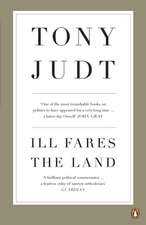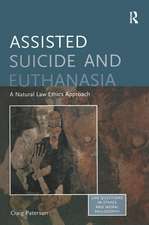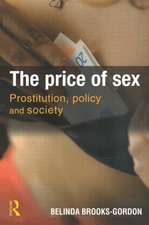How Ethical Systems Change: Lynching and Capital Punishment: Framing 21st Century Social Issues
Autor Sheldon Ekland-Olson, Danielle Dirksen Limba Engleză Paperback – 15 dec 2011
This book is an excerpt from a larger text, Who Lives, Who Dies, Who Decides?, http://www.routledge.com/9780415892476/
| Toate formatele și edițiile | Preț | Express |
|---|---|---|
| Paperback (1) | 228.76 lei 6-8 săpt. | |
| Taylor & Francis – 15 dec 2011 | 228.76 lei 6-8 săpt. | |
| Hardback (1) | 931.20 lei 6-8 săpt. | |
| Taylor & Francis – 17 aug 2016 | 931.20 lei 6-8 săpt. |
Din seria Framing 21st Century Social Issues
-
 Preț: 293.57 lei
Preț: 293.57 lei - 18%
 Preț: 229.38 lei
Preț: 229.38 lei - 38%
 Preț: 981.61 lei
Preț: 981.61 lei -
 Preț: 339.24 lei
Preț: 339.24 lei -
 Preț: 336.53 lei
Preț: 336.53 lei -
 Preț: 339.83 lei
Preț: 339.83 lei -
 Preț: 336.37 lei
Preț: 336.37 lei -
 Preț: 337.29 lei
Preț: 337.29 lei -
 Preț: 337.81 lei
Preț: 337.81 lei - 18%
 Preț: 229.17 lei
Preț: 229.17 lei - 18%
 Preț: 229.77 lei
Preț: 229.77 lei - 47%
 Preț: 142.50 lei
Preț: 142.50 lei -
 Preț: 337.33 lei
Preț: 337.33 lei -
 Preț: 337.50 lei
Preț: 337.50 lei -
 Preț: 345.89 lei
Preț: 345.89 lei - 17%
 Preț: 230.25 lei
Preț: 230.25 lei -
 Preț: 338.73 lei
Preț: 338.73 lei -
 Preț: 345.12 lei
Preț: 345.12 lei -
 Preț: 225.53 lei
Preț: 225.53 lei -
 Preț: 347.80 lei
Preț: 347.80 lei - 21%
 Preț: 222.14 lei
Preț: 222.14 lei - 18%
 Preț: 228.14 lei
Preț: 228.14 lei - 18%
 Preț: 235.21 lei
Preț: 235.21 lei - 18%
 Preț: 997.11 lei
Preț: 997.11 lei - 18%
 Preț: 227.73 lei
Preț: 227.73 lei - 18%
 Preț: 229.38 lei
Preț: 229.38 lei -
 Preț: 338.73 lei
Preț: 338.73 lei -
 Preț: 338.26 lei
Preț: 338.26 lei -
 Preț: 336.96 lei
Preț: 336.96 lei -
 Preț: 343.10 lei
Preț: 343.10 lei - 18%
 Preț: 228.95 lei
Preț: 228.95 lei
Preț: 228.76 lei
Preț vechi: 285.62 lei
-20% Nou
Puncte Express: 343
Preț estimativ în valută:
43.79€ • 47.58$ • 36.80£
43.79€ • 47.58$ • 36.80£
Carte tipărită la comandă
Livrare economică 21 aprilie-05 mai
Preluare comenzi: 021 569.72.76
Specificații
ISBN-13: 9780415505192
ISBN-10: 0415505194
Pagini: 80
Dimensiuni: 178 x 254 x 254 mm
Greutate: 0.15 kg
Ediția:1
Editura: Taylor & Francis
Colecția Routledge
Seria Framing 21st Century Social Issues
Locul publicării:Oxford, United Kingdom
ISBN-10: 0415505194
Pagini: 80
Dimensiuni: 178 x 254 x 254 mm
Greutate: 0.15 kg
Ediția:1
Editura: Taylor & Francis
Colecția Routledge
Seria Framing 21st Century Social Issues
Locul publicării:Oxford, United Kingdom
Public țintă
UndergraduateCuprins
1. What Lies Ahead 2. Removing the Protective Boundaries of Life 3. A Campaign to Stop Executions 4. The Pendulum Swings, the Debate Continues
Notă biografică
Sheldon Ekland-Olson joined The University of Texas at Austin after completing his graduate work at the University of Washington in Seattle and Yale Law School. He is currently the Bernard and Audre Rapoport Centennial Professor of Liberal Arts. He served for five years as Dean of the College of Liberal Arts and then for eight years as Executive Vice President and Provost of the university. He has authored or co-authored several books and numerous articles on criminal justice, prison reform, and capital punishment. Widely recognized for his commitment to teaching undergraduates, he is the recipient of numerous teaching awards. His current interests are reflected in the book manuscript, Who Lives, Who Dies, Who Decides?
Danielle Dirks is an Assistant Professor in the Department of Sociology at Occidental College in Los Angeles, California. She completed her doctoral work at The University of Texas at Austin, with a focus on American capital punishment and the rise of "closure" as a death penalty rationale in the post-Furman era. Her scholarly interests include crime, law, and deviance and racial and ethnic relations in the United States.
Danielle Dirks is an Assistant Professor in the Department of Sociology at Occidental College in Los Angeles, California. She completed her doctoral work at The University of Texas at Austin, with a focus on American capital punishment and the rise of "closure" as a death penalty rationale in the post-Furman era. Her scholarly interests include crime, law, and deviance and racial and ethnic relations in the United States.
Descriere
Slavery, lynching and capital punishment were interwoven in the United States. By mid-twentieth century these connections gave rise to a small but well-focused reform movement. Biased and perfunctory procedures were replaced by prolonged trials and appeals, which some found messy and meaningless. DNA profiling clearly established innocent persons had been sentenced to death. The debate over taking life to protect life continues. This book is based on a hugely popular undergraduate course taught at the University of Texas, and is ideal for those interested in criminal justice, social problems, social inequality, and social movements.
